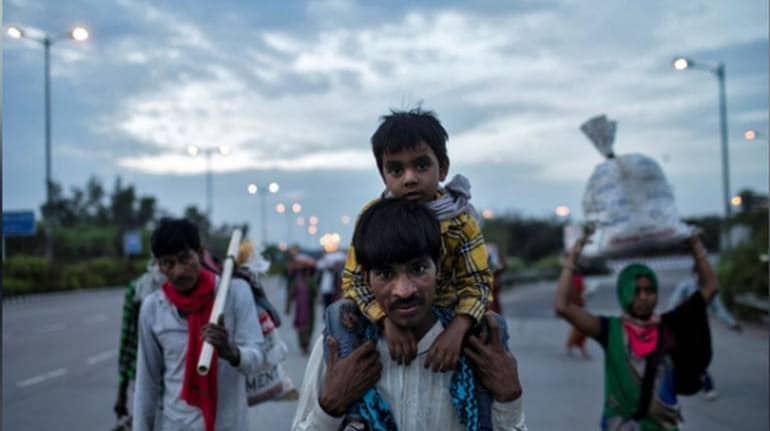
Parliament Monsoon Session 2020: Centre says no data on migrant deaths during lockdown available
The government, however, said that over 1.04 crore migrants had returned to their respective home states after the lockdown
by Moneycontrol NewsThe Centre on September 14 informed Parliament that there is no data available on the number of migrant workers who have lost their lives during the nationwide lockdown, which was announced on March 25 to curb the spread of COVID-19 outbreak in the country.
The response, by the Union Ministry of Labour and Employment, was to a question in the Lok Sabha on whether the government was aware that several migrant workers had died while making their way back to their native places after the announcement of the lockdown, and if state-wise details of the toll can be provided.
The query also sought to know if any compensation, or economic assistance, was provided to the victims' families. To this, the Centre replied that there was no data on the deaths of the migrant workers and so there was no question of providing any compensation to the next of kin, Hindustan Times reported.
"India, as a nation, has responded through the Central and state governments, local bodies, self-help groups (SHGs), resident welfare associations (RWAs), medical health professionals, sanitation workers as well as large number of genuine and bona fide non-governmental organisations (NGOs) in the nation’s fight against the unprecedented human crisis due to the outbreak of COVID–19 and country-wide lockdown..." Santosh Kumar Gangwar, Minister of State (MoS) with independent charge in the Ministry of Labour and Employment, said.
COVID-19 Vaccine
Frequently Asked Questions
View more
How does a vaccine work?
A vaccine works by mimicking a natural infection. A vaccine not only induces immune response to protect people from any future COVID-19 infection, but also helps quickly build herd immunity to put an end to the pandemic. Herd immunity occurs when a sufficient percentage of a population becomes immune to a disease, making the spread of disease from person to person unlikely. The good news is that SARS-CoV-2 virus has been fairly stable, which increases the viability of a vaccine.
How many types of vaccines are there?
There are broadly four types of vaccine — one, a vaccine based on the whole virus (this could be either inactivated, or an attenuated [weakened] virus vaccine); two, a non-replicating viral vector vaccine that uses a benign virus as vector that carries the antigen of SARS-CoV; three, nucleic-acid vaccines that have genetic material like DNA and RNA of antigens like spike protein given to a person, helping human cells decode genetic material and produce the vaccine; and four, protein subunit vaccine wherein the recombinant proteins of SARS-COV-2 along with an adjuvant (booster) is given as a vaccine.
What does it take to develop a vaccine of this kind?
Vaccine development is a long, complex process. Unlike drugs that are given to people with a diseased, vaccines are given to healthy people and also vulnerable sections such as children, pregnant women and the elderly. So rigorous tests are compulsory. History says that the fastest time it took to develop a vaccine is five years, but it usually takes double or sometimes triple that time.
The ministry, however, said that over 1.04 crore migrants had returned to their respective home states after the lockdown. According to the report, Uttar Pradesh topped the list with over 34.4 lakh migrants returning to the state from several parts of the country. UP is followed by Bihar and Rajasthan.
Follow our LIVE Updates from Parliament here.
"The states and Union Territories (UTs) have been advised to take adequate steps to streamline the migration of the workers to mitigate the hardships of migrant workers returning to the destination states/UTs," the ministry told Parliament.
"The states/UTs have also been advised to maintain updated data of the migrant workers to facilitate the administration to extend benefits of the welfare schemes of the government to migrant workers," the ministry added.